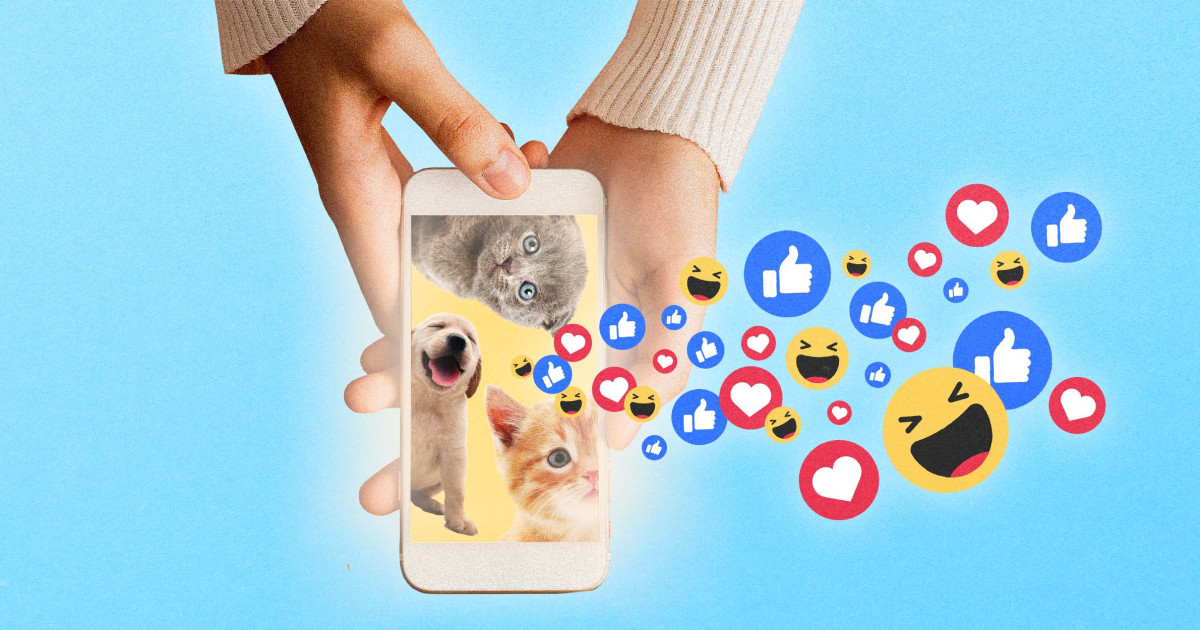
Viewing Covid-related memes can boost your mood and help cope with pandemic-related stress, according to a recent study.
The study, published Monday, shed light on how different kinds of posts can affect a social media user’s emotions, which can influence overall mental health.
Jessica Myrick, study co-author and a Pennsylvania State University professor who studies the psychology of media use, told NBC News that viewing memes won’t necessarily cure you of all stress. But the research did find a “direct connection” between experiencing positive emotions after viewing memes and a “stronger ability” to cope with stress.
“People said that after they viewed the memes, they were more content, or amused or relaxed,” said Myrick, who co-authored the study with Nicholas Eng, a Bellisario College of Communications doctoral student at Penn State, and Robin Nabi, professor of communication at University of California, Santa Barbara.
“They then reported that they were more confident in their ability to cope with the stress associated with living during this pandemic era,” Myrick said.
The research comes amid a fresh wave of skepticism about the impact social media has on mental health, as young women in particular are subjected to highly edited, unrealistic beauty standards.
The study, however, suggested that memes not only provide mood-boosting entertainment, but also can serve as a valuable communication tool for disseminating information about stressful issues, like the Covid-19 pandemic.
For the study, which was published in a special issue of Psychology of Popular Media, researchers showed 748 participants various images. Half of the participants were shown text superimposed on a colorful background, similar to a Facebook post. The other half were shown images of cute animals, which either had a funny non-Covid caption or a Covid-related quip.
A non-Covid meme, for example, showed a studious Chihuahua wearing a black turtleneck and square glasses captioned, “me when I call it Tar-jay instead of Target.” The Covid-related version showed the same image and read, “me when I call it Covid-19 instead of the rona.”
Participants who viewed images with Covid-related captions reported lower Covid-related stress levels. Viewing the same image with a caption not related to Covid didn’t reduce Covid-related stress, but participants reported feeling more positive emotions than those who viewed the Facebook-like text boxes.
The study also suggested that processing information is associated with better coping. Participants who viewed Covid-related memes reported thinking more deeply about what they saw than when they viewed non-Covid memes, in addition to reporting feeling less stressed about the virus.
“So you do not have to necessarily avoid the thing that is stressing you out,” Myrick said. “Instead, seeing this funny, cute social commentary about it actually seemed to help people feel less stressed about it and to think more about it, too.”
The fact that participants reported thinking more deeply about the Covid-related examples shows that memes can be an effective communication tool for spreading information.
Ricky Sans, Instagram’s strategic partner manager for memes — a role he described as a “meme liaison” for creators — said large meme accounts pivoted to posting lighthearted Covid-related content last year.
“This is how people are communicating. … It’s not just a little fad or an image; it’s really a vessel for how we express ourselves,” Sans said. “When we started to go into lockdown, a lot of the meme community evolved instantly and adapted their creative strategies, and I think had realized that they had gigantic platforms to help people out.”
Accounts like Saint Hoax, which has 2.9 million Instagram followers, were early advocates of promoting pandemic safety measures, like social distancing, washing hands and wearing masks.
Platforms like Instagram, TikTok, Twitter and YouTube partnered with the World Health Organization to inform users about limiting the spread of the coronavirus and to dispel misinformation. Sans noted that health information was especially well received on Instagram when it was delivered via meme.
But it doesn’t mean that viewing memes will wipe anxiety entirely. Myrick’s takeaway was that people can better curate their social media feeds to cope with stress. The fact that participants who viewed cute memes reported more positive emotions than participants who only saw text boxes points to how different types of content can influence mood.
Early last year, the World Health Organization recommended limiting media consumption about the coronavirus to mitigate stress. It’s unreasonable to avoid stressful content entirely — reading news articles about Covid-19, natural disasters or political updates is necessary for staying informed.
Medical experts, like those at the Cleveland Clinic, recommend a variety of tools to manage stress: from meditating to deep breathing exercises to taking a walk. Some of those techniques, Myrick pointed out, may not be feasible in the moment.
But looking at wholesome content — like the baby animal memes the researchers showed to participants — can be an easy respite from the cacophony of online discourse and breaking news. Cutesy content may seem frivolous, but it can be used as a “quick intervention” throughout the day for a small mood boost.
This study, Myrick said, indicates how people can navigate social media more mindfully. Rather than endlessly doomscrolling through headlines and catty Facebook arguments, Myrick encouraged users to be aware of how they feel when they consume certain types of content. If you can feel anxiety bubbling up when reading articles about vaccination rates, don’t read the dicey comment section when you’re done. Instead, take a break and watch some cat videos on TikTok.
“It’s OK to start doomscrolling, but [important] to notice it eventually and think about why you are doing that,” Myrick added. “Maybe it’s because you had a bad day or something difficult happened at work, or you had seen too much bad content. Understand, ‘I need to take a break or switch media types.’”
Myrick also recommended curating your social media feeds to include wholesome content, whether that means using platforms differently or making an effort to follow certain accounts so stressful content is peppered with more positive content.
Sans noted that he isn’t a mental health expert, but he said he finds it helpful to follow mental health meme creators on Instagram to mitigate stress. These accounts often post affirmations, remind followers to take a break from doomscrolling and normalize taking care of mental health with refreshingly honest content.
The creator Aiden Rata, for example, is known for posting surreal guided meditations that are as funny as they are soothing.
Social media can take a toll on mental health, between promoting unattainable beauty standards to reducing human communication to enraged quote tweets.
The study, however, suggested that you don’t need to remove yourself from social media entirely. You may just need to temporarily disengage, take a breather with some wholesome content and come back later.
While many dismiss online media, as well as the research surrounding it, as silly, Myrick sees it as an increasingly important tool — especially during periods of isolation.
“It is not a frivolous endeavor to be looking at memes, because you know that other people are laughing at this, too,” Myrick said. “You can share it and bring the ability to cope with stress to other people, too. It’s not just a waste of your time to look at.”
Source: | This article originally belongs to Nbcnews.com









